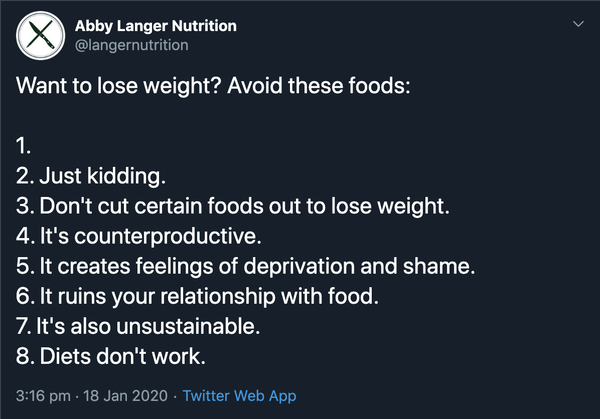In the last decade, the voices of those from the Health At Every Size (HAES) and Body Positivity (BoPo) movements have become louder and louder, gradually infiltrating
from the fringes to the mainstream. There are many positives to this, such as raising valid concerns about weight stigma in healthcare, while also encouraging people to look beyond their weight as a marker of health or self-worth. I'm on board!
But, what seems to have happened more recently is that the attempt to add more nuance to the discussion of weight loss has turned into an all-out sabotage on the process of lifestyle change. It would be unfair to
say that these voices are the norm, as that's not true, but I have had a number of personal trainers and clients worry that they are doing the wrong thing. They're being told that "diets don't work", or that their attempts to improve health should not focus on weight loss? What's the story?
Exhibit A...

The above is a good example of what I am talking about here.
To me, these messages are just as reductionistic and unscientific as those that science-based nutrition professionals are often trying to counter. I do not
think this is doing anything to move the needle forward, and is not empowering the individual trying to make their life better.
The claim that "diets don't work" is a deceptive one. It is not false IF you specify exactly what underpins the statement, but this is meaningless in the real world when the statement stands alone. One could justify the point by saying something like "for most people,
attempts to lose weight tend to fail, as adherence to such practices can be difficult for various reasons, which may vary between individuals". But, for the general population encountering such a statement, it would seem that this, very simply, states that dietary methods designed to restrict calories simply do not work?
This is, of course, untrue. People often ask for specific research to show that people can sustainably lose weight
(generally with the 1-2 year mark being the cut-off for successful maintenance), which, to me, is a classic example of why people get frustrated with academics. Most of you know lots of people in the real world who have successfully lost weight and maintained it, and as trainers, many of us have helped to facilitate that process. However, for the sake of keeping everyone happy, we can find examples in the research of successful weight loss:
The National Weight Control Registry is a US-based registry for individuals who have successfully lost >30lbs (range of 30-300lbs) and maintained it for >1 year (range of 1-66 years). With 10,000+ registered individuals, 98% have changed their food intake in some way to attain/maintain this weight loss. In 2012, analysis was carried out on 2886 individuals enrolled from 1993-2010, finding that, when using a 10% weight loss as the criterion of success, 88%
were estimated to be still successful at Year 5 and 87% at Year 10 (Thomas et al. 2014).
Furthermore, there have been other specific studies carried out that shed light on
the question of successful weight loss maintenance. For example, here is a summary of the CALERIE trial, designed to investigate the effects of 2 years of 25% caloric restriction:
The results of this large, randomised controlled trial provide evidence that a moderate calorie restriction-induced negative energy balance improves multiple cardiometabolic risk factors—waist circumference, blood pressure, HDL-cholesterol, LDL-cholesterol, triglycerides, insulin resistance and glucose control, metabolic syndrome, and chronic inflammatory tone— well below the conventional risk thresholds used in
clinical
practice (Kraus et al. 2019).
Similarly, here are the results from the DIETFITS study, which enlightened us on the fact that the specific type of diet is not
quite important, but caloric restriction can work quite well over the longer term: In the HLF vs HLC diets, respectively, the mean 12-month macronutrient distributions were 48% vs 30% for carbohydrates, 29% vs 45% for fat, and 21% vs 23% for protein. Weight change at 12 months was -5.3 kg for the HLF diet vs -6.0 kg for the HLC diet (mean between-group difference, 0.7 kg [95% CI, -0.2 to 1.6 kg]). There was no significant diet-genotype pattern interaction (P = .20) or diet-insulin secretion
(INS-30) interaction (P = .47) with 12-month weight loss (Gardner et al. 2018).
So, where are we going with this?
The
point here is that these messages are as much about ideology as they are about science. The example given above is not a personal issue, as she could produce fantastic work otherwise; this is simply an example which was shared to thousands of people via other channels and has the potential to mislead. These ideas are becoming more widespread, despite their lack of rigour, so I want to make sure that you appreciate the nuance.
True:
1. Caloric restriction is difficult to adhere to (lots of things are difficult, but this shouldn't detract from the fact that something does or doesn't "work").
2. Excessive restriction (e.g. regarding specific foods as off limits) may be more likely to produce disordered eating behaviours / compromise your relationship with food.
3. You do not need to cut out certain foods in order to lose weight.
False:
1. Diets don't work.
2. All restriction should be treated equally.
3. Weight loss is not a valid goal for someone to have.
Ultimately, you can do what you want, but
don't let people walk all over your experience by telling you that something doesn't work. It's deeply confusing for people who are having success with their dietary practices, and serves to make dietary changes seem a lot more catastrophic than they actually are. Sure, losing weight is a challenge, but catastrophising about it does not make it any easier.